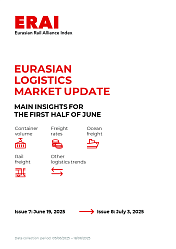Since the first China-Europe freight train departed from Horgos in March 2016, the number of trains handled by the port has grown steadily. It took 54 months for the figure to reach 10,000 trips, 18 months to reach 20,000, less than 16 months to reach 30,000, 14 months to hit 40,000, and less than 13 months to surpass 50,000, according to the report.
The company has handled more than 1,500 trains so far this year, up 20 percent from last year, with total freight volume reaching 4 million tons, up 18 percent, according to the report, citing Zhang Yunyu, business manager of Xinjiang Zhonglian Haitong International Freight Forwarding Co.
The number of China-Europe (China-Central Asia) freight trains passing through Horgos continues to grow. On average, a returning train completes transshipment every two hours, with the daily average exceeding 27 trains, the CCTV report said.
Increasing volumes of China-made goods such as consumer products, electronic devices, and agricultural produce are being transported to Central Asian and European markets through the Xinjiang rail hub.
In May, Horgos Customs launched a reform initiative called «Smart Railway Port + Local Rapid Customs Clearance,» which has significantly improved customs clearance efficiency. The clearance time for imported goods has been reduced from two to three days to within 16 hours, a decrease of about 70 percent. The processing time for locally exported goods has been shortened from six hours to one hour, an 80 percent reduction, official data showed.
«We provide round-the-clock customs clearance services and have set up a dedicated service window for China-Europe freight trains,» said Zhang Kun, deputy head of the third supervision division at Horgos Customs, CCTV reported.
«We offer tailored services based on shippers’ needs, and we have established a priority marshaling and fast-release green channel, and streamlined procedures covering customs declaration, inspection, transshipment, and release to continuously improve the efficiency of freight train operations,» Zhang Kun said.




